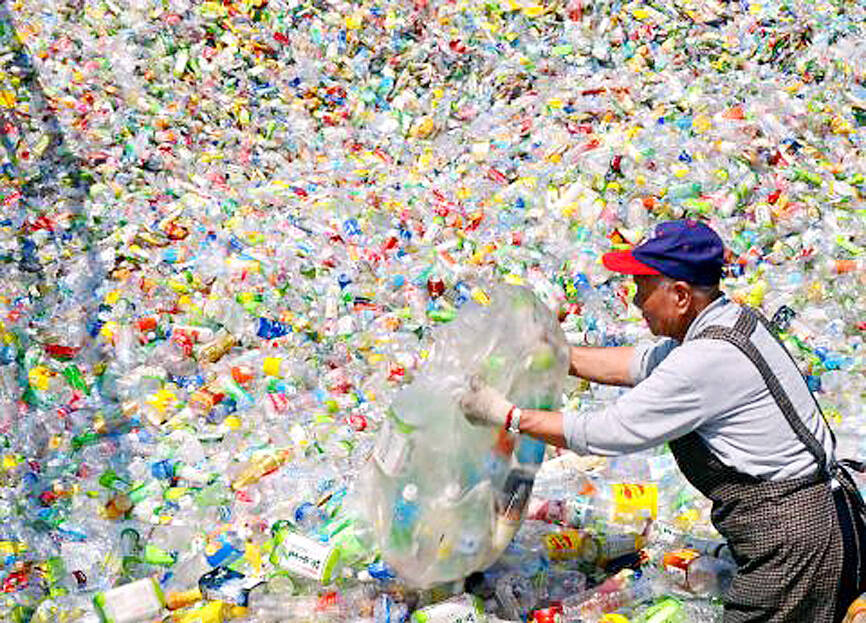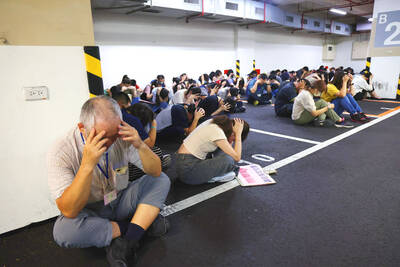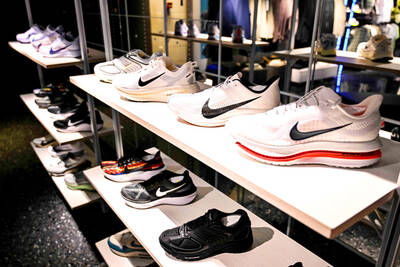A study by Taiwanese researchers showed a correlation between microplastics and decreased levels of brain-derived neurotrophic factor (BDNF) in seabird chicks.
BDNF is a protein that can influence susceptibility to neurodegenerative diseases such as Alzheimer’s disease.
The study examined protein expressions in blood and organs of an Australian seabird species’ chicks, National Cheng Kung University food safety and risk management associate professor Hsu Wei-hsuan (徐瑋萱) said on Saturday.

Photo: Sam Yeh, AFP
It divided the chicks into high and low exposure groups based on the amount of plastic in their stomach, she said.
Results showed that chicks with higher plastic intake had bigger changes in the levels of several proteins, particularly BDNF, which significantly declined in the high exposure group, Hsu said.
BDNF is closely linked to the memory, learning ability and neurodegeneration of human beings, she added.
“The seabirds did not have Alzheimer’s disease, given that it is not a disease in birds. Nor can we say it [decreased BDNF in chicks] is due to microplastic ingestion,” Hsu said.
As the research was conducted on seabirds that ingested plastics in the wild instead of under controlled conditions, it could only show correlations or potential risks, but could not conclude causation, she said.
The study cannot prove that “plastic intake is harmful to the brain,” Hsu added.
Asked whether humans would also be similarly affected, she said that no direct evidence showed that microplastics would harm the human body, although studies have found residual microplastics in people’s blood, placenta and brain.
“We cannot experiment on humans, and plastics vary in texture, size and sources, and can absorb heavy metals or toxins, making it difficult to prove their effects on human beings,” Hsu added.
“For example, microplastics larger than 100 micrometers are usually excreted from the body, but those smaller than 20 micrometers or at the nanometer level might pass through the intestinal wall and stay in the body,” she said.
Although animal experiments have shown microplastics’ negative impacts on the liver, kidney, brain and the reproductive system, they were controlled experiments, Hsu said, adding that they were not the same as human beings’ plastic exposure.
So far, microplastic-related research has yet to amount to anything, as they chose microplastics of various textures and sizes and applied experimental methods that were widely different, she said.
A specific dose toxicity standard is still lacking, she added.
However, research showed that microplastics have already infiltrated daily life, from vegetables and seafood to clothes and objects, Hsu said.
Risks remain even though the causal link between microplastics and neurodegeneration could not be concluded, she said.
Microplastic intake can come from heated plastic containers, fibers that flake off clothes being washed, tea bags in hot water, or dust and debris in the air, Hsu said, urging people to reduce their exposure by using glass or stainless steel foodware and avoiding heating plastic containers.
The study was published last month in the international journal Science Advances.

Environmental groups yesterday filed an appeal with the Executive Yuan, seeking to revoke the environmental impact assessment (EIA) conditionally approved in February for the Hsieh-ho Power Plant’s planned fourth liquefied natural gas (LNG) receiving station off the coast of Keelung. The appeal was filed jointly by the Protect Waimushan Seashore Action Group, the Wild at Heart Legal Defense Association and the Keelung City Taiwan Head Cultural Association, which together held a news conference outside the Executive Yuan in Taipei. Explaining the reasons for the appeal, Wang Hsing-chih (王醒之) of the Protect Waimushan Seashore Action Group said that the EIA failed to address

Taipei on Thursday held urban resilience air raid drills, with residents in one of the exercises’ three “key verification zones” reporting little to no difference compared with previous years, despite government pledges of stricter enforcement. Formerly known as the Wanan exercise, the air raid drills, which concluded yesterday, are now part of the “Urban Resilience Exercise,” which also incorporates the Minan disaster prevention and rescue exercise. In Taipei, the designated key verification zones — where the government said more stringent measures would be enforced — were Songshan (松山), Zhongshan (中山) and Zhongzheng (中正) districts. Air raid sirens sounded at 1:30pm, signaling the

The number of people who reported a same-sex spouse on their income tax increased 1.5-fold from 2020 to 2023, while the overall proportion of taxpayers reporting a spouse decreased by 4.4 percent from 2014 to 2023, Ministry of Finance data showed yesterday. The number of people reporting a spouse on their income tax trended upward from 2014 to 2019, the Department of Statistics said. However, the number decreased in 2020 and 2021, likely due to a drop in marriages during the COVID-19 pandemic and the income of some households falling below the taxable threshold, it said. The number of spousal tax filings rebounded

A saleswoman, surnamed Chen (陳), earlier this month was handed an 18-month prison term for embezzling more than 2,000 pairs of shoes while working at a department store in Tainan. The Tainan District Court convicted Chen of embezzlement in a ruling on July 7, sentencing her to prison for illegally profiting NT$7.32 million (US$248,929) at the expense of her employer. Chen was also given the opportunity to reach a financial settlement, but she declined. Chen was responsible for the sales counter of Nike shoes at Tainan’s Shinkong Mitsukoshi Zhongshan branch, where she had been employed since October 2019. She had previously worked